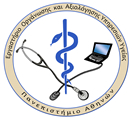Symptoms
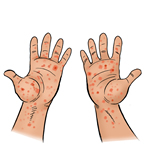 1. Rash (approximately for 5 days, initially on the face, then on the trunk and back and subsequently on the upper and lower extremities) 1. Rash (approximately for 5 days, initially on the face, then on the trunk and back and subsequently on the upper and lower extremities)
|
| |
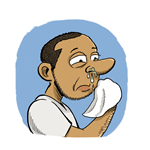 2. Nasal congestion 2. Nasal congestion
|
| |
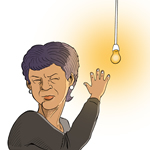 3. Conjunctivitis and eyes sensitive to bright light 3. Conjunctivitis and eyes sensitive to bright light
|
| |
 4. Low fever (up to 38οC approximately for 2 days) 4. Low fever (up to 38οC approximately for 2 days)
|
| |
 5. Cough 5. Cough
|
Transmission
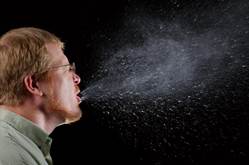
Measles is a highly contagious disease. People who have not been sick with measles or have not been immunized may catch measles. A person with measles is contagious 4 days before symptoms start until about 4 days after the rash appears. When someone with measles sneezes or coughs, virus droplets are spread through the air and may infect other persons or contaminate surfaces, remaining active and infectious for a period of 2 hours at least.
Treatment
For the treatment of measles, seek medical advice. There is no specific therapy. To help manage symptoms, encourage rest, give antipyretics and give the person lots of fluids. Once a person gets sick with measles, lifetime immunity is anticipated.
Prevention
-
Vaccination is the best way to prevent the disease.
-
Children with measles should stay off school for 4-5 days after rash appearance.
-
Children having contact with a person with measles and presenting nasal discharge should be kept away from contact with susceptible individuals, in particular infants and pregnant women.
-
If vaccination is given to persons coming into close contact with a person with measles within 72 hours from exposure to the virus, satisfactory protection is anticipated.
-
Administration of immunoglobulin (IVIG) is given within the first 6 days from exposure to the virus to susceptible (infants less than a year old, pregnant women) or immunosuppressed individuals of the immediate family of a person with measles, who are at increased risk of complications or to the ones for whom vaccination is not indicated.
When to seek medical advice
Call your doctor if you observe the above stated symptoms and measles infection is suspected.
Vaccines
Τhe vaccine for preventing measles is part of the measles-mumps-rubella vaccine (MMR) and of the measles-mumps-rubella-varicella (MMRV) vaccine. Τhe vaccine should be administered in two doses at the ages of 12-15 months and 4-6 years.
References
keelpno
nhs.uk
National Immunization Program for Children and Adolescents 2011
















